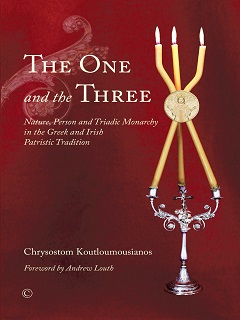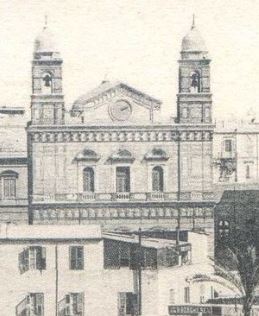

Home News & Events Study Research Members & Staff Publications Friends of the Hellenic Institute Contact Us
The One and the Three: Triadic Monarchy in the Greek and Irish Patristic Tradition and its Anthropological Implications
by Chrysostom Koutloumousianos
Our culture is coloured by two seeming extremes: impersonalisation and egocentricity. The dialectic of the 'internal'-'external' relationship, which characterizes the language of modernity, often finds expression in the severance of the part from the whole and, consequently, the opposition between the individual and society.
Within this context, certain pioneering theologians following and expanding assumptions of philosophy, in an attempt to meet the existential demands of modern man, have built up a personalist view based on a specific understanding of the Divine personhood, according to which everything comes from a person, and that person within the Trinity is the Person of the Father. This view is supposedly ratified by patristic triadological teaching, particularly the teaching on the 'monarchy of the Father'. In the forefront of this trend, the Revd Professor John Zizioulas, Metropolitan of Pergamon, attributes everything to the person of the Father: the cause of the Trinity is the person of the Father, love is identified with the Father; God's immortality, indeed His very essence, derives from the person of the Father. The ontological 'principle' or 'cause' of being is not seen as either essence or nature but invertedly as that which makes up the person. On these grounds the person is detached from nature, aggrandizing the imbalance between the two.
The most challenging aspect of this view is its application in the fields of ecclesiology and anthropology. This 'monarchy' of the person of the Father, accommodated in the 'Eucharistic ecclesiology', invests the 'primus' in the Church (either local or universal) with supreme authority, and in the long run becomes the fulcrum for totalitarian patterns and behaviours. Its anthropological corollary is that the esoteric and creative dimension of man, which springs from the spiritual capacity of the 'inner man', tends to be eclipsed by structure and relations; furthermore, that 'inner man' goes unacknowledged because of fear and distrust of what is seen to be either esotericism or the influence of modern psychology. Prof. Zizioulas is neither the sole nor the first theologian espousing a personalist understanding of the Trinity. The reason that this study focus on him is that he presents this view as being part of the Cappadocian Tradition and is credited with bringing the Greek patristic tradition into contemporary discourse on personhood.
How far can this interpretation, together with its ecclesiological implications, find justification in patristic writings? Taking as point of departure the thought and experience of the Fathers of the Church, this study pursues a thorough understanding of the patristic notion of person and essence, and traces its ecclesiological and anthropological implications, with special reference to the monastic paradigm. In the process it provides a full account of how the Greek Fathers as well as the theologians of the pre-Norman Irish tradition perceived and interpreted the theological term 'monarchy', and explores their notion of person and nature, at the same time tracing the implications of Trinitarian doctrine on anthropology, Church structure and spiritual life, with special reference to the monastic paradigm. Sources examined from the Eastern tradition include the Cappadocian Fathers, Athanasius of Alexandria, Cyril of Alexandria, John Chrysostom, Dionysius the Areopagite, Maximus the Confessor, John of Damascus, and from the Irish tradition Columbanus, Eriugena, early Lives of Saints and the ascetical writings of the Celi de tradition. This study has attempted to grasp the 'soul' of the Holy Fathers, offering a synthetic account of their Trinitarian theology and its perennial meaning for man and society.
Part One exposes the incompatibility between personalistic theo-ontology and patristic theology by exploring the theological notion of 'monarchy' in the writings of the Greek Fathers of the early Byzantine era (3rd-8th c) as well as in the early Irish tradition (5th-10th c). It explores key patristic concepts that form the background to the patristic understanding of the Trinity, namely the perception of the Trinitarian doctrine as the Aristotelian principle of mean; the incomprehensibility of the mode of existence; the understanding of identity and otherness, or nature and hypostasis, within God and in the human being; and the concept of perichoresis (inter-penetration) of the Divine Persons with regard to the essential unity of Divine Being.
Part Two explores the substantiation of patristic Trinitarian doctrine in the philosophy and life of the monastic world of the Greek East and the Irish West, and raises the question of the relation of subjectivity and catholicity within the Church as a model of the Trinity. It investigates the place of the individual in society, the esoteric dimension of the Self, the relation and dialectic of impersonal institutions and personal charisma, specific monastic virtues as ways to the fulfilment of authentic personhood, and the source and locus of unity. It also traces 'oneness' and 'otherness' in the mystery of the world’s transfiguration in God’s grace and human virtue. The human being has to mirror God’s ecstatic perfection through the salvific experience of divine life and the 'science' of the unifying virtues, revealing one essence, one will and energy, one class and glory in unconfounded persons participating in the divine life – revealing the unity of the Trinity in the simplicity of love, and fulfilling the abundance of natural potential.
This study was completed thanks to a Visiting Fellowship at the Hellenic Institute, Royal Holloway, University of London, and was published under the title The One and the Three: Nature, Person and Triadic Monarchy in the Greek and Irish Patristic Tradition (James Clarke and Co Ltd: Cambridge, 2015).
Revd. Dr Chrysostom Koutloumousianos is a priest-monk at the Holy Monastery of Koutloumous, Mount Athos. Having read English Literature at the University of Athens (1986) he pursued BA, MA and PhD studies in Theology at the Aristotle University of Thessalonica (1994-2007). His research interests focus on the history and spirituality of early monasticism, and on the theory and practice of counselling. Since 1986 he lives in the monastery, while visiting other places for lectures.
Publications and Papers: The World and the Desert. A Study of the Ascetic Literature of the Sixth Century (Koutloumous Monastery, Mount Athos, 2002) (in Greek). God of Mysteries: Celtic Theology in the Light of the Greek East (Mount Athos, 2008) (in Greek). Lovers of the Kingdom: the Spirit and Life of Celtic and Byzantine Monasticism (Mount Athos, 2009) (in Greek), pp. 337-47. Il Mondo e il Deserto (Citta Nuova: Rome, 2007) (in Italian). 'Stabilitas and Peregrinatio in Celtic and Byzantine Monasticism', Bulletin of the Department of Theology, Aristotle University of Thessalonica (2007) (in Greek), pp. 147-58. 'La Paternita Spirituale', Italia Ortodossa, XXXI (2007), pp. 27-32 (in Italian). 'Il Volto del Silenzio', Festival Biblico I Volti delle Scritture, Schio 2009. 'Praxis and Theoria in Celtic and Byzantine Monasticism', in Monastic Life and Tradition Conference (Convent of Chrysopege: Chania, 2010) (in Greek), pp. 113-31. 'Natural and Supernatural Revelation in Early Irish and Greek Monastic Thought', in Toward an Ecology of Transfiguration, eds. J. Chryssavgis and B.V. Foltz (Fordham University Press: New York 2013), pp. 137-47. 'The Meaning of Work and Liturgical Office in the Monastic Coenobium', International Conference on Monasticism, St Sergius Lavra, Moscow 2013 (in Russian). 'The Baptism of the Poets: Faith and Poetry in Early Irish Society', Nea Euthene 21 (2014) (in Greek), pp. 12-15. 'Which Beauty will save the World? The ideal of beauty in Irish and Byzantine Monasticism', Nea Euthene 27 (forthcoming, 2015). 'Greek Orthodox Monasticism', Oxford Handbook of Christian Monasticism (forthcoming, 2016).
For further information on the project please contact Revd. Dr Chrysostom, at The Holy Monastery of Koutloumous, Mount Athos, Greece, Tel. +30 23770 22532, or c/o The Hellenic Institute.

